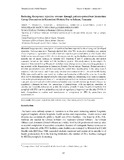| dc.contributor.author | Massele, Amos Y. | |
| dc.contributor.author | Mashalia, Yohana J. | |
| dc.contributor.author | Kayombo, Edmund J. | |
| dc.contributor.author | Mwaiselage, Julius D. | |
| dc.contributor.author | Mwamba, Natu E. | |
| dc.contributor.author | Kaniki, Issessanda | |
| dc.date.accessioned | 2016-07-14T06:21:35Z | |
| dc.date.available | 2016-07-14T06:21:35Z | |
| dc.date.issued | 2011 | |
| dc.identifier.citation | Massele, Amos Y. et al. (2011) Reducing therapeutic injection overuse through patients-prescriber interaction group discussions in Kinondoni District, Dar es Salaam, Tanzania, Tanzania Journal of Health Research, Vol. 13, No. 1, pp. 87-92 | en_US |
| dc.identifier.issn | 1821-6404 | |
| dc.identifier.uri | http://hdl.handle.net/10311/1442 | |
| dc.description.abstract | Inappropriately prescription of injections has been reported in developing and developed countries. Previous studies in Tanzania showed that over 70% of patients attending out- patient clinics at private dispensaries received at least one injection per consultation, a value higher than WHO recommended target of 10%. This is of concern considering the likelihood of adverse effects of possible use of unsafe syringes to transmit HIV, hepatitis B and C, poliomyelitis and added economic impact on the patient and the healthcare system. This study aimed to investigate the impact of Interaction Group Discussion on behavioural change on injection prescribing practices in ten selected public dispensaries in Kinondoni District, Dar es Salaam, Tanzania. Patient records of injection prescriptions were obtained covering the period three months prior to the study from 5 randomly selected control and 5 randomly selected intervention facilities. At each health facility IGDs were conducted for one month on mothers and prescribers followed by a survey 3 months after IGD to determine the impact of IGDs. Chi-square statistical calculations were made to compare data on the percent of prescriptions with an injection prescribed and in those conforming to national standard treatment guidelines (STG) between baseline and 3 months follow up. Results showed no significant difference between the percentage of prescriptions with an injection prescribed at baseline and 3 months follow-up in public dispensaries (P>0.05, Χ2 test). Prescribed injections that complied with STG was low at baseline and did not significantly improve 3 months after (P>0.05, Χ2 test). Comprehensive studies and sensitization of compliance to STG by prescribers are recommended.
________________________________________ | en_US |
| dc.language.iso | en | en_US |
| dc.publisher | Tanzania Journal of Health Research, www.ajol.info/index.php/thrb | en_US |
| dc.subject | Therapeutic injections | en_US |
| dc.subject | Interaction Group Discussion | en_US |
| dc.subject | prescribers | en_US |
| dc.subject | Tanzania | en_US |
| dc.title | Reducing therapeutic injection overuse through patients-prescribers interaction group discussions in Kinondoni District, Dar es Salaam, Tanzania | en_US |
| dc.type | Published Article | en_US |
| dc.link | http://www.bioline.org.br/pdf?th11011 | en_US |

